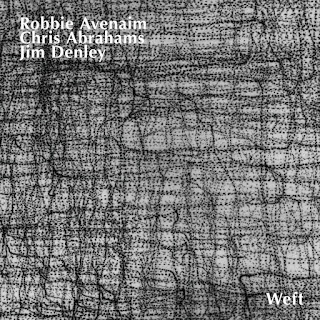By Paul Acquaro
I took a long walk on a bright late winter’s day to listen to Weft in full. It’s one long 45-minute track and for walking, a fine piece. The music flutters ceaselessly like the wind blowing through trees or water cascading through a stream, a trickle of constant, gentle sound. I looked at the barren trees and the nascent buds on some of the bushes. The crocuses were bloomed already, purple, white, pink in the park and in front of some of the buildings. The crackle of the music played, as the sun shined, and I could hear the crunch of my sneakers on the gravel.
At one point I imaged the trio of Antipodean experimental musicians, keyboardist Chris Abrahams (pianist in the Necks), woodwindist Jim Denley and percussionist Robbie Avenaim showing up at the studio, each one having purposefully forgotten a part of their instrument. This deliberate omission would then be used to their advantage. For example, instead of notes from Denley’s bass flute, sculpted air, something with shape but barely a tone.
Avenaim’s ‘prepared typewriter’ adds a percussive texture, or is that Abraham’s vintage synthesizer? The woosh of electrified static and manipulated tones is certainly the work of the Waldorf Q+ and those occasional didgeridoo-like sound is most likely Denley. The collaboration is a collage, like the mixtures of sounds that weave into the surrounds when you simply walk and listen. Here it’s more purposeful, of course, but the effect is a blending of organic and non-organic sounds that unfold in a subtle tone-poem. There are moments of activity that rise above the texture, and the end builds to a denser collection of rhythmic figures. The music on Weft, minimal yet absorbing, proved a good companion for a mid-day walk, and I’m sure in many other contexts as well.


